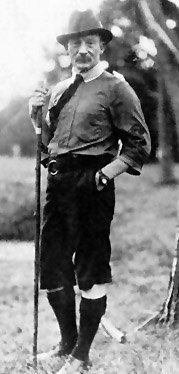The first Scout Camp: Brownsea Island

More than 100 years ago, Robert Baden-Powell was wondering what to do to make the world a better place.
When he was a boy, young Robert Baden-Powell enjoyed being in the outdoors. After school finished, he used to explore the forests, where he would follow the tracks of animals, and make fires for cooking. When he grew up, he chose a career that would lead him to adventures all over the world. He became a soldier in the British army, and spent years travelling around the world, from India to Africa.
By the time he was sent to take part in the Anglo Boer War in South Africa, he was a Colonel, and he was put in charge of the soldiers in a small town called Mafeking, in what is now the North West province of South Africa. While he was there, the town was attacked and surrounded by the enemy. Baden-Powell had to lead the soldiers who were defending the town. The battle was called the Siege of Mafeking, and it went on for 7 months - 217 days. But at last, the rest of the army reached them and the enemy was defeated, and the town was safe. Baden-Powell became a hero!
In those days before rock musicians, film stars and sporting heroes, Baden-Powell's success as a soldier made him a hero for thousands of people in Britain. He was especially famous among boys. Many of them started to read his books. The problem was that those books were about being a soldier, and were written for adults. Baden-Powell decided he needed to do something for the boys who wanted to be like him.
That is why Baden-Powell was wondering how he could teach young people about the skills they would need to "Be Prepared" for the adventures they would have in life. Be Prepared - Baden Powell - both of them start with the letters B-P. He took the words "Be Prepared" and made them his motto.

In August 1907, Baden-Powell took 20 boys from different parts of England, and ran a camp - the very first Scout camp in the world. For the campsite, he chose Brownsea Island, an island about 2 km long, situated in a natural harbour in the South of England. The camp started when B-P blew a note on a kudu horn that he had brought from South Africa. The flag was the flag from Mafikeng.
The boys were divided into four Patrols, each led by a Patrol Leader: Wolves, Ravens, Bulls and Curlews. They each had a colour: Red, Green, Blue and Yellow. Each Patrol had its own campsite and the boys learnt to put up their own tents. They also had duties to keep watch to ensure that they kept their campsite safe. They were worked in pairs, like the "buddy" system Cubs and Scouts use today.
During the camp, they learnt to make fires cook, to follow the tracks of animals, and to stalk without being heard or seen. They learnt about first aid and bravery and service to others. They played tug-of-war, basketball, and many other team games and challenges. At night they held campfires and listened to Baden-Powell's stories of his adventures as a soldier.
On the last day, their parents came to the camp to see what they had learned. The next morning they packed up camp and sailed back from the island to the shore. That was the end of the camp - the first Scout camp in the world.
Baden-Powell now knew that his ideas would be successful. He quickly finished his book, called "Scouting for Boys". Within a few months there were Scout groups starting in England - and soon after that in South Africa.
There is lots more to tell about how Scouting started and spread. The boys from Brownsea Island grew up - and some of them died in battles during the First World War a few years afterwards. Girl Guides, Brownies and Cub Packs were started when sisters and younger brothers wanted to take part as well. Scout groups started all over the world.
Today there are more than 40 million Scouts around the world. But they can all say thank you to the founder of Scouting, Robert Baden-Powell, and the boys at that first Scout camp on Brownsea Island more than 100 years ago.



